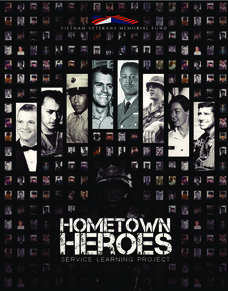PBS
Muhammad Ali: Boxer and Civil Rights Activist
Many young people today know Muhammad Ali as the aging boxer who lit the torch at the 1996 Olympics. Introduce young historians to Ali the boxer, the Civil Rights activist, the war protestor, and the humanitarian with a powerful lesson...
Stanford University
Observing Human Rights Day
How much intervention is appropriate for America to take in cases of human rights violations? Class members ponder a question that has lingered since the birth of America with a series of primary sources that reflect the degree to which...
Equality and Human Rights Commission
Identity
Is identity defined by genes, cultural standards, personal feelings, a combination of these, or something else altogether? Scholars learn about the complex topic of identity with a presentation, a game, and with a series of discussions....
California Academy of Science
Optimal and Sustainable: Renewable Energy Revamp
More than 100 cities around the world have shifted from fossil fuels to renewable energy sources. Scholars investigate a city wanting to make this switch, but needs help determining how to make the shift. Groups consider all options,...
California Academy of Science
Building Better Buses: Transportation Design Challenges
Scholars learn about a series of three challenges when they design a bus system for a small town. They determine the bus routes and then figure out the best type of fuel to use before considering the cost of going electric. Learners...
Digital Public Library of America
Teaching Guide: Exploring Little Women
Louisa May Alcott's Little Women is a literary masterpiece as well as a timestamp of the formative mid-nineteenth century in America. Using a primary source set of photographs, letters, and portraits, readers discuss the ways...
West Virginia Department of Education
Intelligence of Authentic Character - News Coverage and John Brown's Raid
The resource, a standalone, shows how news coverage of John Brown's Raid began when the event happened and how that reporting shaped perception in West Virginia history. The resource includes interesting anticipatory discussion...
iCivics
Step Two: The News and You
With so many news resources, scholars likely feel incredibly confused about what the news means. Pupils participate in reading activities, fill out graphic charts, answer questions on worksheets, and complete a quick write activity.
Smithsonian Institution
Mobilizing Children
Scholars find out how the government used propaganda to mobilize children to help in the war effort. Lesson exercises include analyzing a quote from Franklin Roosevelt, viewing propaganda images and posters, and participating in a lively...
Smithsonian Institution
Women's Role in the War Effort
Did you know that many women were Confederate spies during the Civil War? The resource focuses particularly on the important role women played for both the Union and Confederacy. It uses exercises such as a discussion, video, analyzing...
iCivics
Step Nine: Action Campaign
It's time to take action! Learners strategize their action campaigns by using the resource and past brainstorming activities from the series that help them pinpoint problems in their communities. They use included templates to get the...
iCivics
Step Eight: Positions, Please!
Everyone sees the results of public policy, but not everyone understands the strategy that goes into creating an effective one. Now that your class understands the brainstorming process from earlier in the series, they continue on to the...
iCivics
Step Seven: Brainstorm A-Brewin'
Brainstorming—the art of coming up with endless ideas. Pupils brainstorm how to solve local problems in their counties and eventually narrow their ideas down to one solution as a team.
iCivics
Step Five: All about Public Policy
Public policy is important to understand because it affects everyone. The resource tells middle schoolers how the government uses policy to accomplish goals in the administration. It includes a reading, true or false worksheet, a...
Constitutional Rights Foundation
If Men Were Angels: Teaching the Constitution With the Federalist Papers
Much like the methods of group work, the writers of the Federalist Papers worked together to advocate for their viewpoints against the anti-federalists. The resource enables learners to break into small groups and conduct research before...
Smithsonian Institution
Students’ Response to 9/11—A Documentary Report
Young historians research the devastating attacks of 9/11 and use that information to script their own documentaries. The follow-up activity includes recording the documentary and conducting classmate interviews,
Smithsonian Institution
The Soldier’s Experience—Vietnam versus World War I
The Vietnam War and World War I were two very important—and different—wars. To understand the differences, and similarities, class members watch videos, examine primary source documents, and then create a newscast that examines the...
Smithsonian Institution
POWs
Why did Vietnam POWs and their families receive more media attention than POWs in previous wars? To answer this question, class members view artifacts, read articles, and engage in class discussion. Individuals then assume the voice of...
Smithsonian Institution
Changing Gender Roles on the Home Front
Many historians discuss how gender roles changed because of World War II, but how did this come to be? An informative resource challenges scholars to do some digging and research the information for themselves. They research how...
Smithsonian Institution
Lexington and Concord: Historical Interpretation
Learners view and analyze three different images related to the Battle of Lexington and Concord. They also answer a variety of questions in a graphic organizer to help keep the information straight.
Smithsonian Institution
Two Perspectives on the Battle of Little Bighorn/Greasy Grass
Learners understand why historians conduct research and the importance of perception when it comes to studying history. The resource covers The Wars of Expansion and the Battle of Little Bighorn/Greasy Grass through group work, debate,...
Federal Reserve Bank
The Story of the Federal Reserve: Middle School Lesson Plan
After reading the charming cartoon about the United States Federal Reserve, pupils often need to complete activities to retain their learning. The resource does a wonderful job of using class discussion and various written exercises to...
US Holocaust Museum
Time Capsule in a Milk Can
Imagine dumping out a milk can and finding letters from one of the darkest moments in history! Scholars use Holocaust Reading Passages and research to discover how people recorded and hid history during the events of World War II. They...
Vietnam Veterans Memorial Fund
Hometown Heroes
Transform studying about veterans in a textbook to personal interviews with veterans in the community. Four varying lesson plans make up an entire unit or individualized learning based on your class's needs. Exercises include researching...

























